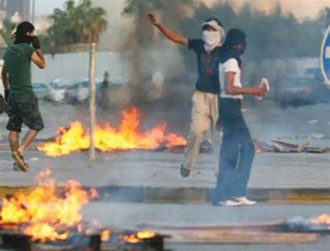
|
 |
 |
|
|
|
|
|
|
|
|
|
|
|
|
|
|
|
|
|
|
|
|
|
|
Riots and Violence in BahrainThe cycle of rioting and violence continues to disrupt Bahrain’s streets, and citizens wake up every day to find cars have been set ablaze, electricity generators destroyed and schools vandalized. The recent escalation of violence is starting to take its toll on the lives of innocent citizens. Two questions arise in regards to the recent unrest: if Bahrain is not an oppressive state and is moving towards democracy, then why is violence re-occurring despite the ongoing political process? And why does there seem to be no end to it in the foreseeable future? Regimes that lack legitimacy are usually the ones threatened with uprisings, but democracies or those in the process of democratization are also not immune from riots, which can occur in any country, whatever its political system. The only difference between the two is that riots in authoritarian regimes can develop into revolutions. The regime in Bahrain does not suffer from a legitimacy crisis, for this legitimacy has been established since the country’s independence and in the 1971 referendum, and has been re-affirmed by public consensus of the 2001 through the Charter referendum. Also, the current political process – despite all criticism - supposedly provides a stable political atmosphere, far from violence and rioting. The current events do not really threaten the legitimacy of the regime as much as they undermine the stability of the country if not controlled.
Riots usually take place in an unsystematic manner, such as a reaction to a government decision opposed by some of the public. However, in Bahrain it is noticeable that riots are systematic, in other words they have become a tool used by those opposed to the political process in order to hinder it or to achieve political gains. Some observers believe that the current political process has succeeded in attracting the greater part of the Bahraini public, but a small group has remained opposed to it. There is, therefore, a need to accelerate and push the political process forward in order to accommodate extremist wings, that is if these latter really do believe in the political process, and find it an appealing substitute to inciting violence. But if they are looking for a radical project which aims to overturn the whole political equation and cancel out the majority’s will, in this case there is no hope in any attempts to accommodate these groups, and other solutions must be found. The real problem in this case would not be in the political process itself, its ‘narrow’ horizons or its capacity to accommodate others, or in the usefulness of the temptations offered to the active political forces. The problem would be in the minority’s attempts to overturn the majority’s choice. It could also be said that riots stem from a culture of violence. In other words, human rights culture and civil and political rights stated in the Charter are still not deeply rooted in the public conscience, either among rioters or others. Undoubtedly, this culture of violence still exists even if it is confined to a small minority, and only with time can the new human rights culture be absorbed by society, after which it can be applied on the ground. Moreover, there are some who attribute the causes of rioting to the economic situation and unemployment in the country, but the situation in Bahrain is not as bad as it seems, especially with the implementation of the Unemployment Insurance Project, which is one of its kind in the Arab world, in addition to the support that families on a low-income, widows and orphans receive from the government, and other projects. Whatever the reasons behind the troubling phenomena of rioting in Bahrain, it is unacceptable as it has become a violent and systematic occurrence used for political purposes. The unrest has caused extensive damage to public properties, has violated citizens’ rights and has threatened innocent lives through the use of Molotov Cocktails which have recently claimed the life of an Asian worker. All political and human rights societies have condemned the riots, assaults on members of the public and vandalism of both private and public properties. But who is behind this unrest? Those who defend riots are those who legitimise and benefit from them. No one can claim that burning electric generators represents a ‘peaceful expression’; nor does attacking cars, including police cars, with the intention of killing those inside them represent a legal or ‘civilised means’. As if there are no other channels of political expression in Bahrain, where citizens have no choice but resort to violence. What is worse is the claim by advocates of violence that those detained on charges of rioting are ‘human rights activists’. In brief, riots are condemned both in a rational and legal sense, and the law should not be lenient towards those who incite or encourage violence. This has been emphasised by the government, civil society institutions and political and human rights societies alike. |
